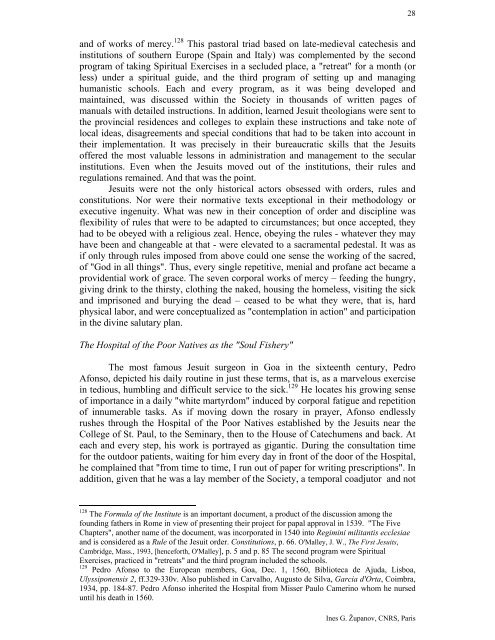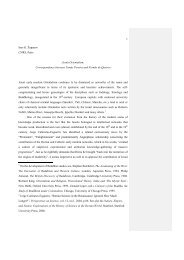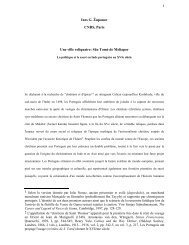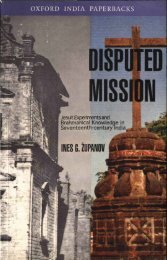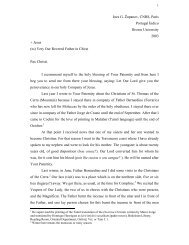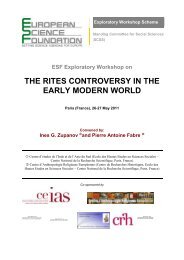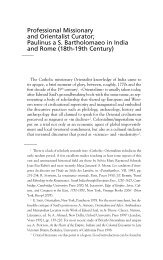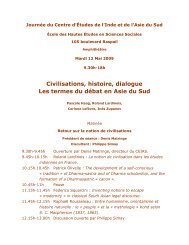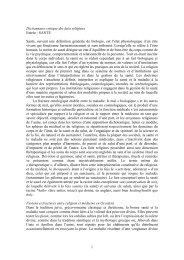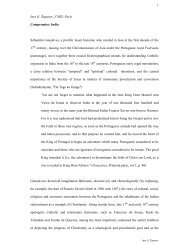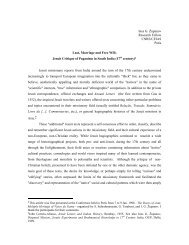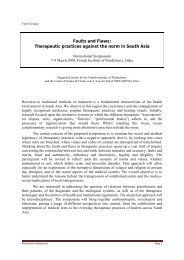Drugs, Health, Bodies and Souls in the Tropics ... - Ines G. Županov
Drugs, Health, Bodies and Souls in the Tropics ... - Ines G. Županov
Drugs, Health, Bodies and Souls in the Tropics ... - Ines G. Županov
Create successful ePaper yourself
Turn your PDF publications into a flip-book with our unique Google optimized e-Paper software.
28<br />
<strong>and</strong> of works of mercy. 128 This pastoral triad based on late-medieval catechesis <strong>and</strong><br />
<strong>in</strong>stitutions of sou<strong>the</strong>rn Europe (Spa<strong>in</strong> <strong>and</strong> Italy) was complemented by <strong>the</strong> second<br />
program of tak<strong>in</strong>g Spiritual Exercises <strong>in</strong> a secluded place, a "retreat" for a month (or<br />
less) under a spiritual guide, <strong>and</strong> <strong>the</strong> third program of sett<strong>in</strong>g up <strong>and</strong> manag<strong>in</strong>g<br />
humanistic schools. Each <strong>and</strong> every program, as it was be<strong>in</strong>g developed <strong>and</strong><br />
ma<strong>in</strong>ta<strong>in</strong>ed, was discussed with<strong>in</strong> <strong>the</strong> Society <strong>in</strong> thous<strong>and</strong>s of written pages of<br />
manuals with detailed <strong>in</strong>structions. In addition, learned Jesuit <strong>the</strong>ologians were sent to<br />
<strong>the</strong> prov<strong>in</strong>cial residences <strong>and</strong> colleges to expla<strong>in</strong> <strong>the</strong>se <strong>in</strong>structions <strong>and</strong> take note of<br />
local ideas, disagreements <strong>and</strong> special conditions that had to be taken <strong>in</strong>to account <strong>in</strong><br />
<strong>the</strong>ir implementation. It was precisely <strong>in</strong> <strong>the</strong>ir bureaucratic skills that <strong>the</strong> Jesuits<br />
offered <strong>the</strong> most valuable lessons <strong>in</strong> adm<strong>in</strong>istration <strong>and</strong> management to <strong>the</strong> secular<br />
<strong>in</strong>stitutions. Even when <strong>the</strong> Jesuits moved out of <strong>the</strong> <strong>in</strong>stitutions, <strong>the</strong>ir rules <strong>and</strong><br />
regulations rema<strong>in</strong>ed. And that was <strong>the</strong> po<strong>in</strong>t.<br />
Jesuits were not <strong>the</strong> only historical actors obsessed with orders, rules <strong>and</strong><br />
constitutions. Nor were <strong>the</strong>ir normative texts exceptional <strong>in</strong> <strong>the</strong>ir methodology or<br />
executive <strong>in</strong>genuity. What was new <strong>in</strong> <strong>the</strong>ir conception of order <strong>and</strong> discipl<strong>in</strong>e was<br />
flexibility of rules that were to be adapted to circumstances; but once accepted, <strong>the</strong>y<br />
had to be obeyed with a religious zeal. Hence, obey<strong>in</strong>g <strong>the</strong> rules - whatever <strong>the</strong>y may<br />
have been <strong>and</strong> changeable at that - were elevated to a sacramental pedestal. It was as<br />
if only through rules imposed from above could one sense <strong>the</strong> work<strong>in</strong>g of <strong>the</strong> sacred,<br />
of "God <strong>in</strong> all th<strong>in</strong>gs". Thus, every s<strong>in</strong>gle repetitive, menial <strong>and</strong> profane act became a<br />
providential work of grace. The seven corporal works of mercy – feed<strong>in</strong>g <strong>the</strong> hungry,<br />
giv<strong>in</strong>g dr<strong>in</strong>k to <strong>the</strong> thirsty, cloth<strong>in</strong>g <strong>the</strong> naked, hous<strong>in</strong>g <strong>the</strong> homeless, visit<strong>in</strong>g <strong>the</strong> sick<br />
<strong>and</strong> imprisoned <strong>and</strong> bury<strong>in</strong>g <strong>the</strong> dead – ceased to be what <strong>the</strong>y were, that is, hard<br />
physical labor, <strong>and</strong> were conceptualized as "contemplation <strong>in</strong> action" <strong>and</strong> participation<br />
<strong>in</strong> <strong>the</strong> div<strong>in</strong>e salutary plan.<br />
The Hospital of <strong>the</strong> Poor Natives as <strong>the</strong> "Soul Fishery"<br />
The most famous Jesuit surgeon <strong>in</strong> Goa <strong>in</strong> <strong>the</strong> sixteenth century, Pedro<br />
Afonso, depicted his daily rout<strong>in</strong>e <strong>in</strong> just <strong>the</strong>se terms, that is, as a marvelous exercise<br />
<strong>in</strong> tedious, humbl<strong>in</strong>g <strong>and</strong> difficult service to <strong>the</strong> sick. 129 He locates his grow<strong>in</strong>g sense<br />
of importance <strong>in</strong> a daily "white martyrdom" <strong>in</strong>duced by corporal fatigue <strong>and</strong> repetition<br />
of <strong>in</strong>numerable tasks. As if mov<strong>in</strong>g down <strong>the</strong> rosary <strong>in</strong> prayer, Afonso endlessly<br />
rushes through <strong>the</strong> Hospital of <strong>the</strong> Poor Natives established by <strong>the</strong> Jesuits near <strong>the</strong><br />
College of St. Paul, to <strong>the</strong> Sem<strong>in</strong>ary, <strong>the</strong>n to <strong>the</strong> House of Catechumens <strong>and</strong> back. At<br />
each <strong>and</strong> every step, his work is portrayed as gigantic. Dur<strong>in</strong>g <strong>the</strong> consultation time<br />
for <strong>the</strong> outdoor patients, wait<strong>in</strong>g for him every day <strong>in</strong> front of <strong>the</strong> door of <strong>the</strong> Hospital,<br />
he compla<strong>in</strong>ed that "from time to time, I run out of paper for writ<strong>in</strong>g prescriptions". In<br />
addition, given that he was a lay member of <strong>the</strong> Society, a temporal coadjutor <strong>and</strong> not<br />
128 The Formula of <strong>the</strong> Institute is an important document, a product of <strong>the</strong> discussion among <strong>the</strong><br />
found<strong>in</strong>g fa<strong>the</strong>rs <strong>in</strong> Rome <strong>in</strong> view of present<strong>in</strong>g <strong>the</strong>ir project for papal approval <strong>in</strong> 1539. "The Five<br />
Chapters", ano<strong>the</strong>r name of <strong>the</strong> document, was <strong>in</strong>corporated <strong>in</strong> 1540 <strong>in</strong>to Regim<strong>in</strong>i militantis ecclesiae<br />
<strong>and</strong> is considered as a Rule of <strong>the</strong> Jesuit order. Constitutions, p. 66. O'Malley, J. W., The First Jesuits,<br />
Cambridge, Mass., 1993, [henceforth, O'Malley], p. 5 <strong>and</strong> p. 85 The second program were Spiritual<br />
Exercises, practiced <strong>in</strong> "retreats" <strong>and</strong> <strong>the</strong> third program <strong>in</strong>cluded <strong>the</strong> schools.<br />
129 Pedro Afonso to <strong>the</strong> European members, Goa, Dec. 1, 1560, Biblioteca de Ajuda, Lisboa,<br />
Ulyssiponensis 2, ff.329-330v. Also published <strong>in</strong> Carvalho, Augusto de Silva, Garcia d'Orta, Coimbra,<br />
1934, pp. 184-87. Pedro Afonso <strong>in</strong>herited <strong>the</strong> Hospital from Misser Paulo Camer<strong>in</strong>o whom he nursed<br />
until his death <strong>in</strong> 1560.<br />
<strong>Ines</strong> G. <strong>Županov</strong>, CNRS, Paris


